- Home
- Bonnye Matthews
Tuksook's Story, 35,000 BC Page 2
Tuksook's Story, 35,000 BC Read online
Page 2
SHORT FACED BEAR. This bear preys primarily on musk oxen, caribou, and horses. If very hungry, they could have overtaken smaller prey. They dwarfed the modern day grizzly.
GIANT MOOSE (Stag Moose). This moose is described as a cross between a moose and an elk. From the places remains have been found, it appears to have inhabited areas typical to today’s moose. Antlers grow on males only. Females and calves could have moved through forests but males would have trouble, due to the width of the antlers. The People in this novel call them giant deer.
GIANT BEAVER. This beaver was eight feet long and weighed up to 220 pounds. They are much like modern beavers except for their teeth and tails. Because of the difference in teeth, there is a question among some scientists as to whether they cut down trees. They lived near lakes and swampy areas. They shared ponds with modern beavers.
CAMEL. Camels originated in North America. Most of their evolution occurred here. They began small, but by the pleistocene, some were exceptionally large. The Alaskan variety is Camelops. Based on findings of vegetation between camel teeth, it is likely they ate whatever vegetation was available.
HORSE. There is general agreement that the most plentiful of all the Alaskan pleistocene animals was the horse. This skeleton provides the silhouette. The picture on the right is a cave painting from Lascaux of a horse, which may typify horses in the Americas since they existed virtually world-wide, though they originated in North America.
DALL SHEEP. These sheep are alive today. The one pictured above is from the mountains by the Seward Highway in Alaska. At Jack Wade Creek in Alaska, a group of fossilized Dall sheep bones, dating to 30,000 years ago, were intermingled with bones from pleistocene bison, caribou, horses.
CARIBOU. Caribou are one of the large animals like the Dall sheep that survived the changes as the Ice Age drew to a close. It’s noteworthy that both male and female caribou grow antlers. The poem, The Night Before Christmas, contains the phrase “click, click, click.” Actually, the caribou make a clicking sound when they walk because of the movement of a tendon.
STELLAR SEA COW. The stellar sea cow lived in salt water and ate kelp. It became extinct a few centuries ago when people discovered that it tasted better than beef. It was slow moving and easy to catch. Sea cows grew to 30 feet in length. They were similar to dugongs or manatees. Its hide is described by Georg Stellar in De Bestiis Marinis, or The Beasts of the Sea (1751) as “black, mangy, wrinkled, rough, hard, and tough; it is void of hairs, and almost impervious to an ax or to the point of a hook.” Their feeding areas were clearly marked by heaps of kelp stalks washing ashore.
WHITE STURGEON. The white sturgeon’s range was the rivers along the North American Pacific coast. Like salmon, it was anadromous, living in both fresh and salt water, but unlike salmon, the sturgeon was not limited to a single return. Some of these fish live for a hundred years. It fed off crustaceans and fish.
Chapter One
Tuksook was very angry. The council meeting of the previous evening had left her shocked, numb, and now it had all turned to anger. She felt betrayed. Her father, Midgenemo, the People’s Wise One, had sat in judgment on a dispute. It was his duty to so do, but his judgment was wrong in her eyes. It didn’t matter whether a person’s heritage was the old People, Minguat, Mol, or the People from Big Lake. All were People. It didn’t matter whether you were male or female. All were People. Tuksook knew the stories. She hadn’t told anybody she knew them. Doing so would end her opportunity for solitude and stop her childhood. But, she knew them. She even knew the significance of each story. Her father had said that the man had authority over his wife. She knew what authority meant, and he misapplied it to lovemaking. He did it in a way that made the stories untrue. The stories made it clear, first, that man was made bigger and stronger than woman to protect her. Second, the stories also made it clear that lovemaking was with mutual consent. Her father’s judgment, according to Tuksook, made wives less than People. Rimut wanted to have sex with Pito, his wife, and she had turned her back on him. She said she was in pain. Rimut wanted permission to require lovemaking when she declined. Her father ruled that a wife had no choice. He brushed the issue of pain aside, because Rimut claimed she was whining in an attempt to avoid him. Tuksook was convinced her father and Rimut had no idea what love was. Tuksook concluded that she would never join with a man. If her father, the Wise One, could betray a woman in pain, she wondered, what would someone else do? She hated the ruling, and she had lost all respect for her father. She wondered whether her feeling toward her father qualified as hatred. She knew Wisdom didn’t want People hating People.
Moments ago, the Wise One had just told her to fly. He wanted to know into what place the river they were entering would lead. Would it be a good place for the People to live? She had to put aside the anger. This was her responsibility for the People. It was hard to put aside the anger. She went down the steps to her place for solitude. The steps were made of bamboo, the same material as the boat. She went to her place near the water and lay down. Still the anger hinted at return. She had to turn loose of it. She forced herself to relax. It was for the People. Finally, she reached the spirit place where she could fly.
Tuksook saw the new land though she appeared asleep. Her name from the old land was the name of an eagle, translating to sees-from-above, a name very strong for a girl of eleven. Her fingers dangled into the salt water. Her spirit was aflight. Tuksook overflew the verdant valley into which they were turning. Waterfalls, rivers, creeks, and streams drained into a central river. The valley went far into the land pocked with many lakes and ponds. Other rivers of good size fed the central river. It was like a tree where the central river was the trunk. Yet other rivers branched off from the main one, while yet others branched from the branches. Branching appeared continuous. They would not thirst here, she reasoned. Something heavy hung over the place, not in the present but it was something to come. What she saw was wonderful for the People at this time. What would come was cold and pressing, but not definable and not of this time. She knew it would be well beyond their lifetimes, but how far beyond she did not know. To her the largest rivers lay as a great bird leg with three toes at the north end. The upper bird leg came from the ocean’s meeting the river from the north. Three toes split off as the river went far inland. One toe pointed to the north, another to the northeast, and the third to the east. She fixed the vision in memory so she could later draw it, showing how mountains defined the large rivers.
Gumui sat near her assuring that no one entered the part of the boat where Tuksook sought refuge. Elfa started down to check the dogs, but Gumui waved her away before she began the descent to the low level.
The land was so beautiful; it brought tears to Tuksook’s eyes. The tears startled Gumui. The green filled her soul with joy. The winds of change had blown. Their land across the sea to the west had become lifeless from a long time worsening drought. This land brought hope for renewal. She saw animals in the forests—many of them—and more in the open fields. Some were strange to her. Out of a deep sense of responsibility, she returned to the boat, feeling the tug that indicated her flight reached the conclusion of its purpose. She had wanted to fly further to see the massive mountain far to the north. She had a gift, a special skill reserved for a certain person, but that gift came with constraints. She had to be obedient to the constraints. Wisdom made it clear: the flight was for the People’s needs, not her curiosity. She was never to use it for personal reasons.
“You’re back,” Gumui said quietly. The sun glinted in tiny lights from his auburn hair that fell forward as he leaned over her. A leather headband kept it from his face. He watched her deep blue eyes flutter under her brows, pale yellow-white as the grass in their parched land. Her hair of the same color wisped in the slight breeze, tangled. She had the rare, coveted sloped upper head shape, the greatest mark of beauty in women and manliness in men among the People, but the color of her hair was considered the least appealing. He reached for her hand and
pulled it from the cold water to her side to let it dry in the sun. Tuksook was just a child, but she fascinated him ever since she began to fly. He felt then a need to protect her. It was an automatic response—not one reasoned in his mind web.
“It’s perfect,” she murmured, her dark blue eyes shining with new knowledge. A slight smile parted her lips to show two bright white front upper teeth that did not quite touch. She shut her eyes to avoid the glare of the sunshine. She would have much to share when the council met that night. Thoughts of the council made the anger creep back into her belly.
Tuksook lay near the caged dogs. They had learned to remain quiet and still for the long boat sailing after some days of whining and pacing. They had also learned to be careful with food, for it would slip through the bamboo and become unreachable. They enjoyed their freedom once a day when older children let them out so they could clean the cages. For cleaning they lowered birch buckets over the side on strong rope to gather water to pour over the cage floors. It was not a pleasant job, but it had to be done. Dogs were assigned the lower deck only, except for Tictip, the dog favored by the Wise One.
Gumui left Tuksook and climbed over the bamboo log steps to reach the higher level of the boat. “Wise One,” he called to a stocky, bald, gray-bearded man of forty years.
Midgenemo, turned and looked at Gumui with an air of expectancy. Instead of speaking, he raised his eyebrows. He was awaiting Tuksook’s initial view. Had it been very negative, he’d have considered turning the boat back to sea. He didn’t have to tell anyone that. They knew.
“Perfect,” was the reply to which Midgenemo and those who heard smiled with enthusiasm and relief. They had found their new home. Almost. Midgenemo looked up. Quietly, he spoke, “Thank you, Wisdom. This is a place of peace. We will prosper and be grateful here.” Midgenemo could hardly wait to put his feet on land. The boat sailing had been very stressful. He rarely slept.
Huaga, a leader of the boatmen, and some of the boatmen had trained the People who would migrate to sail. The training took much time, but the People were passable at sailing. Arriving at the river assured those in the boat that their training had been sufficient. They did not consider themselves boatmen. Midgenemo’s overwhelming responsibility was to lead the sailing to their new land.
Rowers muscled the boat mid-river against the current. As they moved up-river, the valley gave them a welcome fragrance of green growing things. Their effort increased significantly on hearing the word from Tuksook. They kept to the middle of the river since they were unaware of its depth.
“Lower depth pole,” Togomoo shouted. Depth poles were marked with leather to show the measure of a man height. They were usually four to five man heights. Two men took a bamboo pole and secured it to the holders on the bow of the boat. They lowered it to a man height more than the lowest part of the boat in the water. It would warn them if the river became too shallow for the boat to navigate.
“Look for a place above the lower level of this valley.” Midgenemo’s voice carried well, even though it wasn’t loud. All on the upper level of the boat heard easily. “A level place that has a good view of below,” he continued. “A place safe from a surprise water rising and from eyes of strangers. Near running water and forest.”
People on the boat listened carefully to the requirements and began to scan the river banks. How they longed to walk on land. Evergreens and hardwoods filled the low-and mid-lands. Tall volcanic peaks stood like watchers. Clearly, there was no drought in this land. They’d never seen a place so inviting. Wildlife noticed them with curiosity not fear. Stencellomak began to sing a rowing song. Rowers and others joined in. Those who rowed put more muscle to it. They were nearing home.
After their evening meal, Midgenemo called out, “Council meeting!” All but the rowers gathered around the central hearth on the upper deck where flat stones surrounded a sand pit. The Wise One took his seat. Everyone looked at Tuksook expectantly.
“Tuksook,” the Wise One nodded to her.
Tuksook knelt at the hearth, across from her father, not next to him as usual. He didn’t notice. She blew on the ashes to remove them. She spread the sand and remaining ashes for a smooth surface. She drew with a small hardwood twig an amazingly accurate picture of the main rivers in the valley including their relative length and width.
“An eagle seizes the land,” she explained. “See how the upper leg of the eagle is the river’s exit to the sea. The leg goes over the land and ends with three toes.” As she spoke, her graceful hands pointed to the rivers that looked like toes. “White mountains,” she said, carefully placing pebbles on the sand to mark snow-covered volcanoes. Mountains of lesser height rose on the sides of the rivers. There were five main sets of mountains. Tuksook sat with her eyes downcast. She didn’t dare permit herself to be caught glaring at her father. Pains in her belly from the harbored anger were seizing her again.
The People nodded. They made the vision of the eagle seizing the land a permanent, visual part of their mind webs. They noticed the mountains and fixed their positions in memory. Tuksook had given them a map of their valley even to the relative size of the rivers. They would know where they were as long as they were in the valley.
“Leave the drawing,” Midgenemo said. “When you relieve the rowers,” he continued as he looked at the men who would be the next rowing relief, “Tuksook will show them the valley. I would like to call this valley Eagle’s Grasp. Any objections?”
There was total silence among the People. That meant they all agreed.
“It is aggreed,” the Wise One said, using his right fist to strike his open left hand.
The chatter began as the People returned to what they’d been doing. Many comments filled the air—“good omen,” “eagles seize what has great value,” “good council,” “good land,” “healthy air,” “beautifully green,” and so on. Comments floated on the spring air as butterflies, there one moment and gone the next.
Two days later upriver, Amuin, spotted a meadow of great size, barely visible, uphill on the sunrise side of the river as they progressed north. The land was sequestered behind trees. “Look!” she shouted, pointing to the place on the hillside.
Murmuring from the People on the boat clearly supported their agreement. For some it took more time to find the place she saw, but when they saw it, all knew. They had their home. Rowers moved the boat as swiftly as possible toward the place.
The boat finally reached the place closest to the land that they could reach since the depth pole had bent, the boatmen lowered stone anchors, finding that they were in relatively shallow water. Two men, Hamaklob and Togomoo climbed down the side of the boat and slipped into the clear water. They estimated it was about two man-lengths deep, maybe a little deeper. They bobbed to the surface to alert their boatmen to anchor the boat fully on all sides. The People on the boat appeared calm and quiet, but inside they were very excited. Everyone wanted to reach land to begin their new lives in this inviting place.
Togomoo and Hamaklob swam to the shore with their spears. Quickly they shook off the water and sought the best approach to the upper level. An animal path made a diagonal up the cliff face through trees. Tree tops on either side of the path intertwined above the path. It was not visible to those in the boat. Eagerly they climbed the path looking for tracks to identify what wildlife might use the trail. Those on the boat watched the men. Occasionally, they could see them move through the trees up the path.
Hamaklob reached the flat land, standing at the edge by the trees waiting for Togomoo. He was thirty-five and in his prime. Wet from the swim, his long black hair stuck to his back. His leather headband was soaked and a bit tilted. His wide-open brown eyes surveyed the meadow. Togomoo at age thirty was a time shadow copy of Hamaklob. Togomoo reached the top and noticed the smile on his cousin’s face and a hand signal for silence. They gawked. There were four camels browsing. The men didn’t know what they were but took them for food animals. Clearly, browsers used the meadow. The space
was expansive while well protected by the trees that might have hidden it from them. Evergreens and hardwoods surrounded the flat land. At the far side of the land there was a waterfall about the height of a man. It plunged into a catch pool. They observed that the pool was large enough to store four to six hunts’ worth of meat. No caves or large rock shelters appeared to be available. The men wondered how they’d shelter from the cold, but they knew that necessity would be resolved quickly. Hamaklob squatted down. With his strong hands, he dug down into the soil. He raised the soil to his nose and inhaled. “Good,” he said quietly, moving his hands toward Togomoo, who also smelled it and smiled. They’d return to the boat quickly to bring the others.
For the People, disembarkation was uncharacteristically loud and disorganized. A new place and new circumstances seemed in part to require patterns different from those to which they were accustomed. Coupled with a delight to be on land again, the People found it hard to contain themselves. They were adjusting but it was awkward. All day the People brought things from the boat to the land above. They had transported much, not knowing what to expect in their new place. Children old enough to help did so with an air of importance, not for themselves but rather for the progress they helped make. Older girls watched over children too young to help. They organized them into skills practice and singing. Some infants or crawlers were simply placed on spread out skins. When they needed feeding, one of the girls took the infant or crawler to its mother.
The release of the dogs brought the People unintended entertainment. They followed the People up the path after a swim from the boat. Each dog stopped at the opening to the meadow, and then they’d take off running all over the wide open space, barking. Old dogs looked like pups. Finally, they’d lie down panting, gazing at their new home. Midgenemo had already chosen the place for the dogs. He beckoned to Elfa to take them to their place to show them their boundaries. He selected the northwest corner of the meadow so the dogs could see the river and warn of anyone below.

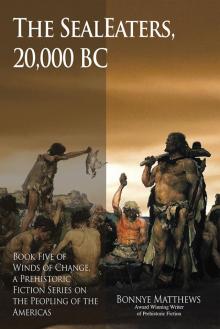 The SealEaters, 20,000 BC
The SealEaters, 20,000 BC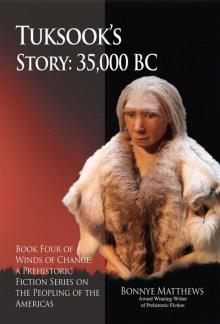 Tuksook's Story, 35,000 BC
Tuksook's Story, 35,000 BC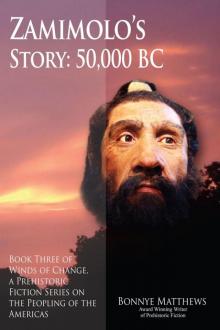 Zamimolo’s Story, 50,000 BC: Book Three of Winds of Change, a Prehistoric Fiction Series on the Peopling of the Americas (Winds of Change series 3)
Zamimolo’s Story, 50,000 BC: Book Three of Winds of Change, a Prehistoric Fiction Series on the Peopling of the Americas (Winds of Change series 3)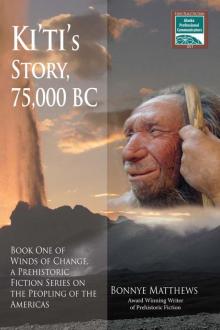 Ki'ti's Story, 75,000 BC
Ki'ti's Story, 75,000 BC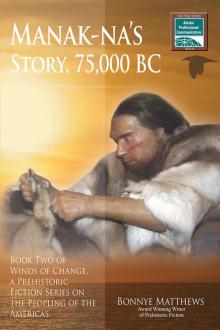 Manak-na's Story, 75,000 BC
Manak-na's Story, 75,000 BC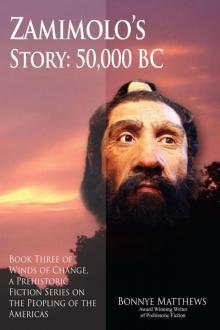 Zamimolo’s Story, 50,000 BC
Zamimolo’s Story, 50,000 BC